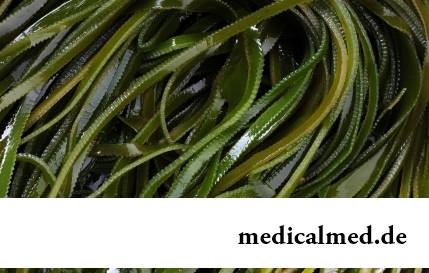





Hemophilia
Hemophilia (hemophilia; Greek haima – blood + Greek philia – tendency) – the hereditary disease which is transmitted on recessive, linked to a floor, to type, VIII or IX blood coagulations caused by insufficiency of plasma factors; it is characterized by symptoms of the raised bleeding.
Types of hemophilia:
- hemophilia And – caused by insufficiency of a factor of the VIII blood coagulation;
- Cristmas disease (synonym: Kristmas's disease) – caused by deficit of a plasma factor of the IX blood coagulation;
- hemophilia inhibitory – caused by emergence of anticoagulants in blood which inhibit activity of factors VIII or IX blood coagulations;
- hemophilia kofaktorny – caused by lack of cofactors (activators) of factors VIII or IX blood coagulations; existence of this hemophilia finally is not proved;
- hemophilia vascular (angiogemophilia) – differing in sharp increase in a bleeding time and reduction of contents or activity of the VIII blood-coagulation factors;
- hemophilia thrombasthenic (synonym: the thrombasthenia) is shown in dysfunction of thrombocytes, at their invariable number in blood, symptoms are similar on observed at a Werlhof's disease.
During sneezing our organism completely stops working. Even heart stops.

It is pleasant to state a possibility of improvement of quality of life of people with problems of functioning of secretory system. By efforts that...
Section: Articles about health
An eye of the person daily experiences considerable strain. The problem of preservation of sight is for many years directly connected with a question of supply of tissues of eye enough oxygen and nutrients. This task is carried out by small vessels – capillaries. For holes...
Section: Articles about health
For residents of the countries of Southeast Asia various algas are an obligatory component of a daily diet. Their popularity is connected not only with high tastes, but also with numerous curative properties. Russians are a little familiar with products such that is distressing: algas are so useful that they should be eaten as often as possible. Let's get acquainted closer with useful properties of this seafood....
Section: Articles about health
All got used long ago that, having addressed the plastic surgeon, it is possible to modify natural parameters of a figure or to reduce...
Section: Articles about health
The cosmetics intended for improvement of a condition of skin, nails and hair are used by each woman. Expenses on regular acquisition of the fashionable widely advertized products of well-known companies for many become very notable and significantly to an obrema...
Section: Articles about health
Almost each of us during life faced dissatisfaction with own body. At such moments, as a rule, we begin to shame ourselves, urgently we go on the most rigid diet promising minus of 10 kg in a week, or we exhaust ourselves in the gym to almost death. As a rule, similar attempts come to an end with a campaign to the refrigerator for jamming of the next stress. Further history repeats itself with individual frequency....
Section: Articles about health
The nature does not stand stagnation and monotony. It is known that tissues of a human body atrophy if do not receive necessary loadings...
Section: Articles about health
Mushrooms - the surprising inhabitants of our planet having a set of wonderful qualities. Thanks to one of them, a mold mushroom of Penicillium notatum, the first natural antibiotic - penicillin was received nearly 80 years ago. The mankind is obliged to this opening миллио...
Section: Articles about health
Not without reason doctors say that 90% of diseases begin or develop because of misoperation of intestines. Disturbance of its functions is connected with various factors among which the important place belongs to excessive "clutter" of an intestinal path. In an organism not only the remains of food, but also mass of harmful substances which we with food accepted accumulate. Accepted to accept, and about that to remove them, did not take care. And in it a problem....
Section: Articles about health
Iodine - one of thirty most important microelements in our organism. The main role of iodine consists in synthesis thyroid гормо...
Section: Articles about health
All like to sing. Small children with pleasure are engaged in a vocal, not especially thinking of hit in a melody. Adults most often hesitate, being afraid to show lack of talents in this area, and it is vain: singing is very useful for health....
Section: Articles about health
Beauty shop – the place which is associated only with positive emotions: joy, pleasure, relaxation. However visit of salon where work with biological material of clients, not always harmlessly is conducted. Today more than 100 pathogenic microorganisms who can catch in beauty shop including deadly to health are known....
Section: Articles about health
We live during an advertizing era. Daily each person receives a solid portion of persuasive councils about what to eat to be здо...
Section: Articles about health
For the last decades the diabetes mellitus of the second type became really world problem. The number of cases annually increases, and average age of patients for whom the illness is diagnosed, steadily decreases. Specialists consider that one of osno...
Section: Articles about health
Not everyone can brag of the shining Hollywood smile. Even the person who is regularly visiting the stomatologist and watching of oral cavities over health periodically has problems: enamel of teeth darkens under the influence of some products, on it the deposits giving to teeth a grayish or yellowish shade collect....
Section: Articles about health
Several decades ago the basil (the district khan, реан, Reagan) was considered as a part of the Caucasian or east cuisine, but today it is strong for...
Section: Articles about health
Shops of household appliances offer us the huge choice of various devices for the house. Whether there are among this abundance devices which not only facilitate house work, but also help to keep health of the person? Of course, and we will tell about them today....
Section: Articles about health
High temperature - a frequent symptom of such widespread diseases as a SARS, quinsy, pneumonia, etc. To reduce heat, having facilitated a condition of the patient, doctors recommend to accept antipyretics, however their use is not always possible. Too frequent use of these drugs can lead to allergic reactions, and also overdose, causing poisoning. It happens also that there are no antipyretics simply in the house. In these situations it is pertinent to use it...
Section: Articles about health
The unpleasant feelings connected with spring breakdown are familiar almost to each of us. Often happens that in March-April on the person...
Section: Articles about health
Epilepsy is one of widespread neurologic diseases. Parents, whose children suffer from this illness, should face rumors and delusions, many of which remained since the Middle Ages....
Section: Articles about health
Practically each person is familiar with the annoying, pulling, unscrewing pains caused by overcooling of muscles of a back. In certain cases inflammatory process is not limited to discomfort, being followed by emergence of hypostasis, consolidations, temperature increase. At the wrong treatment the acute miositis can lead to a chronic disease or aggravation of other pathologies of a back (vertebral hernia, osteochondrosis) therefore it is important to pay attention to symptoms of an illness in time and to start to...
Section: Articles about health
The concept "gluten" (differently, a gluten) combines group of the proteins which are a part of rye, barley and wheat. For most of people упот...
Section: Articles about health
Urogenital candidiasis (milkwoman) – a fungal infection which annoys unpleasant feelings in the field of generative organs, being followed by white curdled allocations, an itch, discomfort during an urination, pain. She is called by Candida fungus – a mustache...
Section: Articles about health
Healthy lifestyle today in fashion, and many parents think of that the child from the early childhood played sports. Trainings will help it to become strong and hardy, will improve coordination of movements, and also will exert positive impact on mentality: it will become more collected and purposeful....
Section: Articles about health
Impossibility to conceive the child – a trouble of many Russian families. During quite long time was considered that the main "culprits...
Section: Articles about health
Energy saving lamps are one of the most popular products of innovative technologies, and there is no wonder: they much more economic also are more long-lasting than usual filament lamps. At the same time there are fears that energy saving bulbs can become the reasons...
Section: Articles about health
A little more than a century ago goat milk was a traditional food stuff of most of Russians. Unfortunately, today on tables of our compatriots it appears extremely seldom. The reason that the use of so useful product practically came to naught, not only in very modest volumes of its production and, respectively, rather high cost. Potential consumers are just insufficiently informed on unique properties of goat milk and that advantage which...
Section: Articles about health
